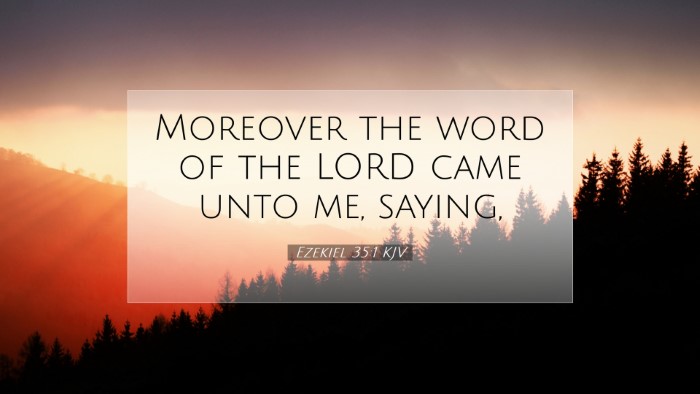Commentary on Ezekiel 35:1
Ezekiel 35:1 states: "Moreover the word of the LORD came unto me, saying,."
Introduction
This verse serves as an introduction to a significant prophecy directed against Mount Seir, representative of Edom, a nation known for its historic enmity towards Israel. The prophetic message is imbued with deep theological implications concerning judgment, justice, and the sovereignty of God. Historical commentaries have examined the relevance of this text, reflecting on both its ancient context and its enduring messages for contemporary readers.
Contextual Analysis
The book of Ezekiel is set against the backdrop of Israel’s exile in Babylon. Ezekiel, as a prophet, was tasked with communicating God's messages concerning judgment and restoration. The southern kingdom of Judah had fallen to Babylonian captivity, and Ezekiel's prophecies often reflect themes of hope amidst despair. By turning his attention to Edom in chapter 35, Ezekiel underscores God’s concern not only for Israel but also for the surrounding nations that had wronged His people.
Theological Insights
The beginning of this chapter places emphasis on the divine origin of the message—“the word of the LORD.” This divine mandate is central to prophetic literature, highlighting that the words spoken are not Ezekiel's personal insights but rather God's revelations delivered through him. This assertion raises important theological considerations about the nature of prophecy and divine communication.
The Role of Prophecy
According to Matthew Henry, the prophetic vocation is both a privilege and a responsibility, demanding clarity and fidelity in conveying God’s truth. The phrase "the word of the LORD" asserts both authority and urgency, marking a turning point in the narrative. This is not merely a message of judgment but also serves to remind the audience that God’s justice will prevail, even against those who have opposed His chosen nation.
God’s Sovereignty and Justice
Albert Barnes notes that the invocation of God’s word emphasizes His control over history and nations. The Edomites, often embittered by Israel's successes, had celebrated the downfall of Jerusalem. In this context, Ezekiel's prophecy serves as a theological reminder that all nations are ultimately accountable to God. His justice is inescapable, and the misdeeds of Edom will not go unpunished.
Historical Context
Adam Clarke provides insight into the historical animosities that colored the relationship between Israel and Edom. Edom’s geography, situated to the south of Judah, made it a critical player in the regional dynamics of the time. Clarke points to Edom’s historic aggressions, notably during the Babylonian siege, where they rejoiced at the misfortunes of Judah. This historical context enriches our understanding of why this prophecy was particularly pertinent.
Application for Today
For contemporary readers, this passage raises fundamental questions about justice, accountability, and the nature of God’s relationship with nations. It invites serious reflection on how modern-day Edoms—those who might take pleasure in the downfall of others—will be held accountable for their actions. The prophetic word stands as a warning against pride and vindictiveness, urging a return to humility and justice.
Reflection for Pastors and Theologians
- Historical Awareness: Pastors are encouraged to teach their congregations about the historical and thematic relevance of the Old Testament, particularly the prophetic texts that inform our understanding of God's nature and justice.
- Preaching Justice: The emphasis on God's judgment against Edom can be leveraged to remind congregations that God cares deeply about justice and righteousness, urging them to engage in societal and ethical justice today.
- The Word of the Lord: Reflecting on the nature of prophetic messages can inspire deeper exploration of how God speaks into the lives of people today, emphasizing the importance of listening and responding to divine guidance.
Conclusion
In summary, Ezekiel 35:1 serves not only as a historical declaration but also as a pivotal lesson on the nature of God’s justice. The message against Edom invites a broader discourse on the accountability of nations, the importance of humility, and the significance of prophetic voices throughout history and in contemporary contexts. As we engage with these themes, may we remain attuned to God’s word and responsive to His call for justice and mercy in our own lives.


